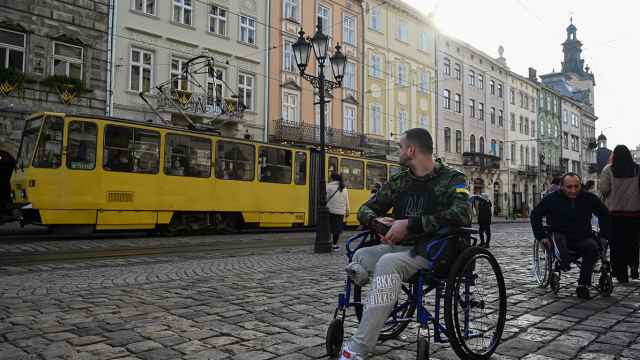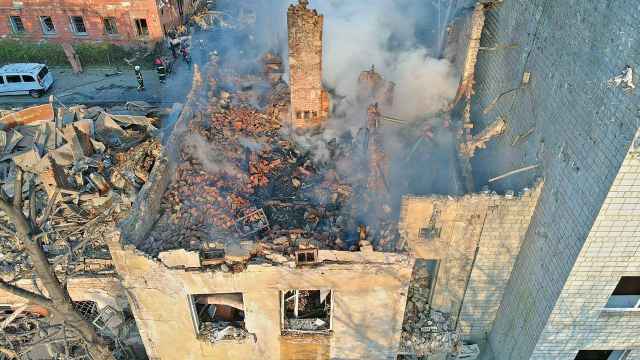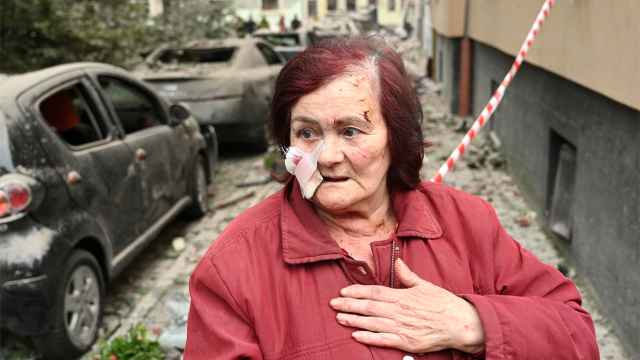A missile that hit an apartment block in Ukraine's Lviv killed four people on Thursday, in what its mayor said was the biggest attack on civilian infrastructure in the city since the start of the Russian invasion.
While Russia regularly pounds Ukraine with missiles, artillery and drones, the Lviv region in the west, hundreds of kilometers from the frontlines and near the Polish border, has largely been spared the aerial onslaughts.
"An apartment building was damaged as a result of the Russian missile attack," Ukraine's Interior Minister Ihor Klymenko wrote on Telegram.
"The 3rd and 4th floors in two sections of the house were destroyed... As of 7:00 a.m., four people were killed, nine were injured."
Rescuers were working to reach those still trapped under rubble, he said.
AFP footage showed emergency responders clearing rubble and wood from the gutted first floor of a building in the city.
Cars covered in dust and with their windows blown out lined a pavement piled with debris.
One elderly lady carried a cage with a bird inside away from the scene.
"I woke up from the first explosion, but we didn't have time to leave the apartment," Olya, 37, told AFP.
"There was a second explosion, the ceiling started to fall, my mother was immediately hit," she said.
"I got to the window, started screaming, and in about half an hour the rescuers got to me, took me out and took me to the 8th hospital," Olya added.
"I came back and found out that my mother had died, my neighbors had died. At this point, it seems that I was the only one who survived from the fourth floor. It's a miracle."
More than 50 apartments were "ruined" and a dormitory at Lviv Polytechnic University was damaged, Mayor Andriy Sadovyi posted on Telegram.
An office building had been damaged and a school building had been destroyed, he said.
"This is the biggest attack on Lviv's civilian infrastructure since the beginning" of Russia's invasion, he said.
"Consequences of the night attack by Russian terrorists," Ukrainian President Volodymyr Zelensky wrote alongside a Telegram video post showing a damaged building.
"There will definitely be a response to the enemy. A tangible one."
It was unclear how many missiles had been launched.
'Sorting through debris'
Earlier, regional governor Maksym Kozytski said several missiles were "moving in the direction of the western regions," citing Ukraine's Air Force Command.
Unverified videos posted to Telegram purporting to show the aftermath of a strike showed shattered glass littering the floor of what appeared to be a dormitory.
It was not clear if the videos showed the same strike.
On June 20, Lviv was hit by a major Russian drone assault that also targeted other cities including Kyiv.
Ukraine has recently bolstered its air defense systems with Western-supplied weapons and the number of Russian missiles and drones breaking through has diminished.
But the spokesman for Ukraine's air force, Yuriy Ignat, recently said that newly supplied systems were still insufficient to cover the whole country.
Slow weapons deliveries to Ukraine delayed Kyiv's planned counteroffensive, allowing Russia to bolster its defences in occupied areas, Zelensky said in a TV interview broadcast Wednesday.
"Our slowed-down counteroffensive is happening due to certain difficulties in the battlefield. Everything is heavily mined there," he told CNN via a translator in the pre-taped interview.
A Message from The Moscow Times:
Dear readers,
We are facing unprecedented challenges. Russia's Prosecutor General's Office has designated The Moscow Times as an "undesirable" organization, criminalizing our work and putting our staff at risk of prosecution. This follows our earlier unjust labeling as a "foreign agent."
These actions are direct attempts to silence independent journalism in Russia. The authorities claim our work "discredits the decisions of the Russian leadership." We see things differently: we strive to provide accurate, unbiased reporting on Russia.
We, the journalists of The Moscow Times, refuse to be silenced. But to continue our work, we need your help.
Your support, no matter how small, makes a world of difference. If you can, please support us monthly starting from just $2. It's quick to set up, and every contribution makes a significant impact.
By supporting The Moscow Times, you're defending open, independent journalism in the face of repression. Thank you for standing with us.
Remind me later.






